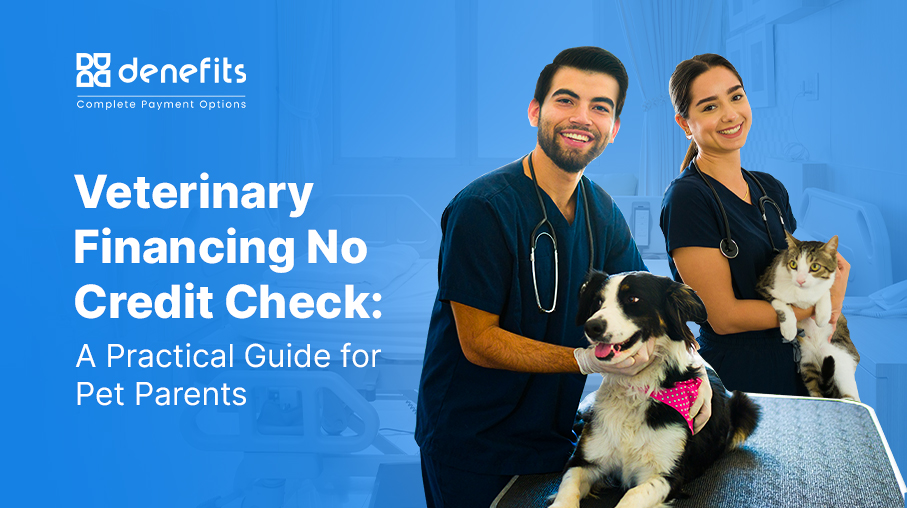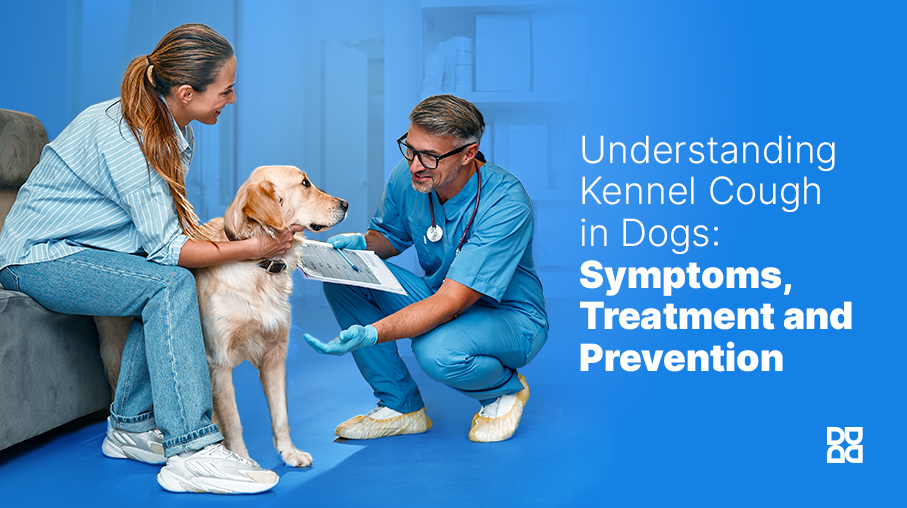
Pets are family, and cost shouldn’t get in the way of their timely care. That is precisely where Veterinary Financing No Credit Check comes to the rescue.
According to the American Pet Products Association, nearly 66% of U.S. households own a pet—that’s over 86 million homes filled with wagging tails, gentle purrs, and unspoken companionship. Yet what many don’t realize is that this bond comes with responsibilities as real as any human relationship. One of the biggest? Their health.
Veterinary care is not just an occasional errand; it’s a vital part of keeping your fur baby safe and thriving. But here’s the hard truth: the average cost of a routine vet visit in the U.S. ranges from $60 to $150, and that doesn’t even begin to touch emergency vet cost, diagnostic tests, or treatment for chronic conditions.
When you bring a pet into your life, you’re choosing love, but also a lifelong commitment. And health complications—unpredictable and often urgent—don’t exactly come with a warning. Whether it’s a minor sneeze or a suspicious limp, a vet visit might be non-negotiable. And when the costs pile up, not being prepared can lead to heartbreaking delays in care.
So let’s break down the real costs, the common and rare reasons pets need medical attention, and most importantly—how you can afford it, even with a low credit score. After all, being familiar with the concepts of veterinary financing, animal hospital payment plans, financing for pet surgery, emergency vet financing can be a lifesaver for your pets.

Get a Better Understanding of Kennel Cough in Dogs, from Symptoms to Treatment
Firstly, What Is Veterinary Care?
Veterinary care isn’t just for sick pets. It’s the full spectrum of services provided by licensed animal doctors to prevent, diagnose, and treat illnesses in animals. Whether you’re visiting an animal hospital with payment plans or a small vet clinic with payment plans, the services typically include:
- Routine checkups
- Vaccinations
- Preventive care (e.g., flea/tick/heartworm treatments)
- Diagnostics (bloodwork, X-rays, ultrasounds)
- Emergency treatment
- Surgery
- Chronic condition management
Veterinary care is to your pet what a general practitioner, surgeon, and specialist are to you-rolled into one.
Why Regular Vet Visits Matter More Than You Think
It’s not just about getting shots or trimming nails. Regular vet visits help identify health issues before they become life-threatening. And that is why being aware of Veterinary financing no credit check or pet financing no credit check options is all the more important.
For example: Kidney disease in cats, when caught early through routine blood tests, can be managed for years. Left undiagnosed, it can cause irreversible damage and shorten their life significantly. Similarly, heartworm disease in dogs, if detected early, can be treated without complications. But if it progresses, it can lead to heart failure—or worse.
Routine care can literally be the difference between life and death. So, it’s a good idea to take your pet for regular check-ups. You can consider a vet clinic with payment plans in your area for the same.
The Real Cost of Veterinary Visits in the U.S.
Let’s talk numbers. A standard vet visit isn’t just a 10-minute chat. It can include:
- Physical examination
- Consultation and advice
- Basic testing (urine, fecal)
- Vaccinations
- Prescription of medications
- Preventive treatments
These add up quickly.
| Type of Visit | Average Cost |
| Routine Checkup | $60 – $150 |
| Vaccinations (per shot) | $20 – $80 |
| Blood Tests | $100 – $200 |
| Fecal Exam | $25 – $50 |
| Dental Cleaning | $200 – $500 |
| Emergency Exam Fee | $100 – $250 |
And this should give you a better understanding of why you should already have emergency vets with payment plans or low-cost vets that take payments in your contacts.
Average Veterinary Visit Costs by State
Here’s a snapshot of how veterinary costs vary depending on where you live:
| State | Average Vet Visit Cost |
| California | $85 – $175 |
| Texas | $75 – $150 |
| Florida | $70 – $140 |
| New York | $90 – $200 |
| Illinois | $80 – $160 |
| Pennsylvania | $75 – $145 |
| North Carolina | $65 – $135 |
| Ohio | $70 – $140 |
| Washington | $85 – $170 |
| Arizona | $75 – $155 |
| Colorado | $80 – $165 |
| Georgia | $100 – $250 |
| Michigan | $65 – $130 |
| New Jersey | $85 – $175 |
| Nevada | $100 – $250 |
| Pennsylvania | $80 – $160 |
Data compiled from local clinic reports and industry averages.
Not exactly cheap, is it? So next time, do look up “payment plan vets near me” or “vets near me that take payments” before making that vet visit.
Common Reasons Behind Vet Visits and Their Costs
Some of the most frequent vet visits stem from conditions that are either preventable or manageable—if treated in time.
| Condition | Average Treatment Cost |
| Ear Infections (Dogs) | $150 – $300 |
| Skin Allergies | $200 – $500 |
| Vomiting/Diarrhea | $100 – $350 |
| Urinary Tract Infections | $150 – $400 |
| Arthritis Management | $250 – $600 |
| Parasite Control (Fleas) | $50 – $150 |
Rare Conditions and Emergency Vet Cost
Now let’s look at the rarer (but often more severe) cases that result in higher expenses:
| Condition | Average Treatment Cost |
| Cancer (Chemotherapy) | $3,000 – $10,000 |
| Orthopedic Surgery | $2,000 – $6,000 |
| Foreign Object Ingestion | $1,500 – $3,500 |
| Heart Disease Treatment | $500 – $2,000 |
| Autoimmune Disorders | $1,000 – $3,000 |
| Emergency C-Sections | $1,500 – $4,000 |
Veterinary Care Isn’t Just for Dogs and Cats
While dogs and cats dominate the vet charts, rabbits, guinea pigs, reptiles, birds, and even fish need medical attention too. Exotic pet care often requires specialized knowledge and tools—making it even more expensive and harder to access in some areas.
Whether it’s beak trimming for a parrot or surgery for a leopard gecko, these animals rely on you to be their advocate and protector.
Factors That Influence the Cost of Veterinary Care
Many factors impact what you pay at the vet—some obvious, others not so much.
Here’s an in-depth look:
| Factor | Description | Cost Impact |
| Type of Pet | Dogs and exotic pets usually cost more than cats due to size and complexity. | Moderate to High |
| Location | Urban areas generally charge higher fees than rural clinics. | Moderate to High |
| Type of Service | Preventive care is cheaper than diagnostics or surgery. | Low to High |
| Emergency vs. Routine | Emergency services can double or triple the cost of care. | Very High |
| Diagnostic Tests | Bloodwork, X-rays, MRIs increase costs significantly. | High |
| Medications Prescribed | Some treatments require long-term or high-cost medications. | Moderate to High |
| Specialist Involvement | If a specialist is required (e.g., oncology, neurology), fees spike. | High |
| Hospitalization | Overnight or extended care increases costs with boarding, feeding, and 24/7 monitoring. | Moderate |
| Follow-up Appointments | Chronic conditions often require multiple follow-ups. | Cumulative |
Additional Costs: Tests, Treatments, and Medications
We’ve talked about vet visits, but what often catches pet parents off guard is what comes after the check-up.
A seemingly “routine” appointment can quickly turn into a series of additional procedures:
| Additional Service | Estimated Cost Range |
| Blood Work (Basic Panel) | $100 – $200 |
| X-Rays | $150 – $300 |
| Ultrasounds | $300 – $600 |
| Biopsies | $400 – $800 |
| Medications (1-month avg.) | $25 – $200+ |
| Allergy Testing | $250 – $600 |
When stacked together, these costs can multiply fast, especially if a condition requires long-term treatment. A $60 visit can turn into $600 without warning — and that’s not counting emergency procedures or hospitalization.
Consequences of Delaying Veterinary Care
What happens if you can't pay your emergency vet bill? Well, nobody likes seeing their pet in discomfort — even a sneeze can send us spiraling into worry. And delaying care due to cost can have serious repercussions.
A minor limp could be a sprain—or the early sign of joint deterioration. Ignoring a small skin bump? That could be the difference between a harmless cyst and malignant cancer.
Delaying care may result in:
- Condition worsening (and higher treatment cost later)
- Increased pain and suffering for your pet
- Fewer treatment options
- Emergency care instead of preventive
- Permanent damage or fatality in severe cases
In short: waiting costs more—in money and heartache. And this is when finding an “emergency vet with payment plan near me” can be a life savior.
How to Afford Veterinary Care When It Counts
When your pet needs care now, finances shouldn’t stand in the way. Thankfully, there are a few ways to make veterinary costs more manageable—even with no credit check.
1. Flexible Payment Plans
Many clinics now offer vet clinic payment plans that let you pay in installments rather than all at once.
2. Pet Insurance
Plans start as low as $20/month and can cover up to 90% of vet bills depending on the provider and policy.
3. Wellness Packages
Some vet offices offer prepaid bundles for routine services like checkups, vaccinations, and dental cleanings—saving you money over time.
4. Emergency Pet Care Funds
Setting aside even $10–$20/month in a dedicated pet fund can ease the blow of unexpected care.
5. No Credit Check Financing with Denefits
For pet parents with low or no credit, Denefits offers a practical, stress-free solution. Here's why it's gaining traction:
Benefits of Denefits: A Lifeline for Pet Owners
Not everyone has good credit. And not everyone should be punished for that when it comes to taking care of a living being who depends on them.
Denefits offers:
- No credit check financing — approval based on identity, not credit history
- Flexible payment plans — break down a $600 bill into easy monthly payments
- Instant approvals — apply and get a plan within minutes
When it’s urgent and you need help, Denefits bridges the gap between care and affordability.
Simple Home Tips to Keep Vet Visits Minimal
While vet care is essential, everyday habits can go a long way in keeping your pet healthy and reducing how often you need those visits.
General Health Tips for Pets
- Maintain a consistent feeding schedule with species-appropriate food
- Groom regularly to avoid skin infections, mats, or parasites
- Brush their teeth or provide dental chews to prevent oral diseases
- Exercise daily—from walks to enrichment toys, keep them moving
- Monitor for subtle changes like low energy, changes in eating, or new behaviors
- Keep vaccines and parasite control up to date
Being proactive with care helps reduce both emotional and financial stress later on.
Final Word: Love Means Being Prepared
Having a pet is one of the most rewarding experiences in life. They’re not just animals—they’re companions, confidants, and family. And just like any family member, they deserve care, comfort, and a safety net for when things go wrong.
Vet costs are real—but they don’t have to be terrifying. With a mix of planning, financial tools like veterinary payment plans, and compassionate service providers like Denefits, you don’t have to choose between love and affordability.
When in doubt, always ask: “If this were my child, what would I do?”
Because chances are, your pet already sees you the same way.
FAQs: Veterinary Financing, Costs, and More
Q1. Can I get veterinary care with no credit check?
Yes. Many providers now partner with financing companies like Denefits, which offer vet payment plans with no credit check.
Q2. What’s the average cost of a vet visit in the U.S.?
A routine check-up typically costs between $60 to $150, depending on location and service level.
Q3. What factors increase the cost of vet care?
Emergency services, diagnostic testing, medications, specialist care, and where you live all play a major role.
Q4. Do vets do payment plans/ do vets offer payment plans?
Yes, the answer to do vets offer payment plans is yes. Search for a vet clinic with payment plans near me, vets that accept payment plans near me, or ask your current vet about available options.
Q5. What should I do if I can’t afford emergency vet treatment?
You can look into payment plans for pet surgery, apply for Denefits, or contact local animal welfare groups for assistance.
Q6. Do exotic pets have higher vet costs?
Often, yes. Exotic animals like reptiles, birds, or small mammals usually require specialized care, which can cost more.
Q7. What are some common vet visit reasons and their costs?
Things like ear infections, diarrhea, UTIs, and skin conditions can cost anywhere from $100 to $500 depending on severity.
Q8. What are rare but expensive conditions I should be aware of?
Cancer, orthopedic surgeries, and autoimmune disorders can cost thousands of dollars, especially if treatment is ongoing.



